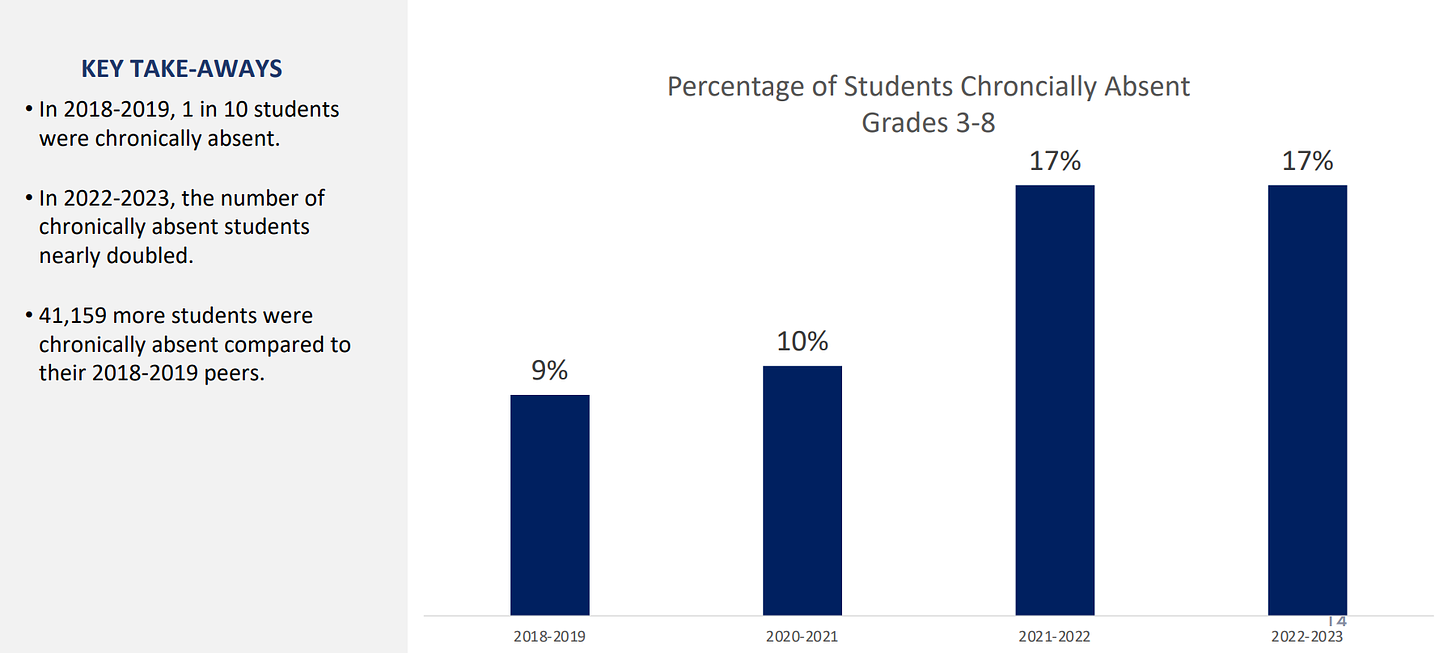
Chronic absenteeism is rising, alarming people across the political divide. Tamping it down requires sound policy, and leaders who model showing up.
Talk to any adult who has had some success in life, and you’re likely to hear a version of this adage: “90% of life is just showing up.”
Companies, governments, associations, civic groups, and more only work when they can depend on the people who are affiliated with them to attend meetings and events. Failure to do so leads to the end of such groups (See: Bowling Alone). And when employees engage in such behavior, poor reviews and dismissals follow.
Fewer of us are getting that message.
Absenteeism has become the norm in many work environments as companies and worker are rethinking work productivity post-COVID.
In certain cases, responsible individuals can be more productive working remotely than they can working in the office. On the flip side, some argue that the isolation of the work-from-home environment has led to less innovation (though there are challenges to this belief.)
Leaving the work debate aside, there’s little doubt that chronic absenteeism directly harms student achievement.
At every level of education, schools, districts, advocacy groups, and leaders are now pressing the message that attendance matters.
State, District, School are All In
The Virginia Department of Education has rightly raised the hurricane flags about the rising truancy rate in Virginia. The VDOE has noted that:
- Chronic absenteeism correlates to low academic achievement
- Absenteeism is a powerful predictor of dropout rates
- Absenteeism has been linked to poor outcomes later in life
How bad has the problem become? A slide from an ALL in VA presentation available on the VDOE website paints the depth of the problem using cold, indisputable numbers.

And the impacts of this are beyond dispute.
A study by the U.S. Department of Education found that:
- Irregular attendance can be a better predictor of whether students will drop out before graduation than test scores
- High school dropout, which chronically absent students are more likely to experience, has been linked to poor outcomes later in life, from poverty and diminished health to involvement in the criminal justice system.
It’s no surprise, therefore, that at the district level, schools are aggressively pushing the message that students must be in school.
In Spotsylvania this coming year, the district will be using the Attendance Works program to drive home the importance of preschool and elementary students attending school regularly.
And at the school level, the message about attendance continues to be a regular topic of discussion. At Ni River Middle School last September, for example, the school used a “Pay Attention to Attendance” flyer to help educate parents about the importance of having children in-class and ready to learn.
Besides the academic benefits associated with showing up, schools are paying closer attention to attendance now because in 2015 the Every Student Succeeds Act required that states “include in their school report cards how many students are chronically absent.”
While bureaucratic number-gathering can be overly burdensome on schools, given the correlation between attendance and academic achievement, this is a reasonable data point to track.
Leading by Example
Lecturing and ad campaigns and threats of punishment only go so far, of course.
At the end of the day, students get the message best when those charged with leading them model the very behavior they’re being asked to adopt.
In March the Advance wrote about the chronic absenteeism of two School Board members — Lisa Phelps and April Gillespie.
At that time, we wrote:
Spotsylvania School Board members April Gillespie, Berkeley district representative, and Lisa Phelps, Lee Hill district representative, have either been absent or left early from nine out of the 10 meetings the School Board has held so far this year.
Since then, the two have missed at least three more meetings: April 3, June 24, and most recently on Monday night, July 8.
The Advance reached out to Patty Boller, Clerk of the Board, to see if any reasons were given for their absence. She referred us to Phelps and Gillespie. As of publication, Gillespie had not responded. Phelps replied with an apparently automated “Currently unavailable” message.
The Advance also checked with Board Chair Lorita Daniels, asking if either Phelps or Gillespie gave a reason for not attending.
“Not that I’m aware of,” she responded.
Giving the two the benefit of the doubt, and assuming they had legitimate reasons for not attending on July 8, there remains a disturbing pattern of absences. A pattern that was not apparent in 2022, when Phelps sat in the majority. As we reported in March:
The Board has not approved minutes from any meetings held in 2023, but according to a review of approved minutes from 2022, Phelps only missed one of the 33 meetings held that year, and Gillespie missed none.
We doubt that were Phelps or Gillespie teachers they would accept from them the level of absences the two have recently displayed as Board members sitting on the dais.
Yes, it is true that their majority was roundly defeated in November’s election.
Yes, it’s true that they are likely to be on the losing side of contentious votes than the winning side. (We would hope that on routine matters of business in which politics should have little or no influence, they would find themselves voting with the majority, rather the vote be yea or nah, more often.)
And yes, losing is a jolt to anyone’s pride.
But standing up and respecting voters’ decisions is one of the most important jobs any losing party must display. It is an acknowledgement that the democratic process is more important than any individual ambition. By their continually failing to show, Gillespie and Phelps are signaling their distaste for November’s results.
Frustrated they may be. But that does not mean they no longer have an obligation to the people of the districts they represent. While the majority Board they held for two years is gone, Phelps and Gillespie remain the duly elected representatives of those in the Berkeley and Lee Hill districts. Those citizens deserve to have their voices heard, and their concerns shared with, the sitting School Board.
It is past time that Gillespie and Phelps put November, and their personal grievances with their fellow Board members, aside and focus on the jobs they were elected to do.
Leaders show up.
Rest assured, students who are being told that attendance matters, are paying attention.
Follow us on Facebook | Instagram | Youtube

Local Obituaries
To view local obituaries or to send a note to family and loved ones, please visit our website at the link that follows.

Support Award-winning, Locally Focused Journalism

The FXBG Advance cuts through the talking points to deliver both incisive and informative news about the issues, people, and organizations that daily affect your life. And we do it in a multi-partisan format that has no equal in this region. Over the past month, our reporting was:
$8 a month supports great journalism
- First to report on a Spotsylvania School teacher arrested for bringing drugs onto campus.
- First to report on new facility fees leveled by MWHC on patient bills.
- First to detail controversial traffic numbers submitted by Stafford staff on the Buc-ee’s project
- Provided extensive coverage of the cellphone bans that are sweeping local school districts.
- And so much more, like Clay Jones, Drew Gallagher, Hank Silverberg, and more.
For just $8 a month, you can help support top-flight journalism that puts people over policies.
Your contributions 100% support our journalists.
Help us as we continue to grow!





